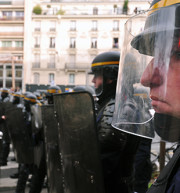
(English) GENÈVE – L'état d'urgence en vigueur en France et la loi sur la surveillance des communications électroniques imposent des restrictions excessives et disproportionnées sur les libertés fondamentales, a averti aujourd'hui un groupe d'experts en droit de l’homme des Nations Unies*. Parmi les préoccupations qu’ils ont partagé avec le gouvernement français, les experts indépendants ont souligné le manque de clarté et de précision de plusieurs dispositions des lois sur l'état d'urgence et la surveillance, portant sur la nature et la portée des restrictions à l'exercice légitime du droit à la liberté d’expression, la liberté de réunion pacifique et d'association et le droit à la vie privée. « Alors que la France débat sur le renforcement des mesures dans la lutte contre le terrorisme, et à cet effet s’engage dans une réforme de la procédure pénale, nous appelons à réviser ces dispositions et possibles réformes, afin d’assurer leur conformité au regard du droit international des droits de l’homme » ont-ils souligné. Pour garantir l’état de droit et prévenir des procédures arbitraires, les experts recommandent l’exercice d’un contrôle judiciaire préalable sur les mesures anti-terroristes. La loi sur l’état d’urgence, en vigueur... Continue reading →

(français) GENEVA – The current state of emergency in France and the law on surveillance of electronic communications impose excessive and disproportionate restrictions on fundamental freedoms, a group of United Nations human rights experts* warned today. In a list of concerns shared with the French Government, the independent experts stressed the lack of clarity and precision of several provisions of the state of emergency and surveillance laws, related to the nature and scope of restrictions to the legitimate exercise of right to freedom of expression, freedom of peaceful assembly and association and the right to privacy. “As France debates the strengthening of measures in the fight against terrorism, and considers a reform of the criminal procedure, we call on the authorities to revise the provisions and possible reforms adopted to that end, to ensure they comply with international human rights law,” they noted. In order to guarantee the rule of law and prevent arbitrary procedures, the experts recommend the adoption of prior judicial controls over anti-terrorism measures. The state of emergency law in force since the recent terrorist attacks in France, which temporarily expands the powers of the executive in the fight against terrorism, only allows judicial review a posteriori. The... Continue reading →

A number of UN human rights experts on Thursday expressed their dismay at the continuing abuse of anti-terrorism legislation to curb freedom of expression in Ethiopia. A week ago, three journalists and two opposition politicians* were given prison sentences ranging from 14 years to life imprisonment under Ethiopia's anti-terrorism laws. This follows the sentencing of two Swedish journalists to 11 years in prison on 27 December 2011. Another 24 defendants are scheduled to appear before the court on 5 March 2012, for various charges under the anti-terrorism law, several of whom may face the death sentence if convicted. “Journalists play a crucial role in promoting accountability of public officials by investigating and informing the public about human rights violations,” said Frank La Rue, UN Special Rapporteur on freedom of expression, who emphasized that “they should not face criminal proceedings for carrying out their legitimate work, let alone be severely punished. Ethiopia has an obligation to fully guarantee all individuals’ right to freedom of opinion and expression under international human rights law.” Ben Emmerson, Special Rapporteur on counter-terrorism and human rights, said that “the anti-terrorism provisions should not be abused and need to be clearly defined in Ethiopian... Continue reading →